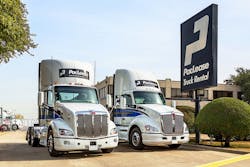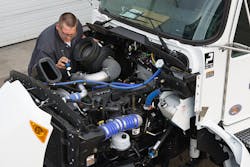Leasing rules are changing, but fiscal advantages will remain
New lease accounting rules will be hitting the books in a little over a year, changing how trucking companies that lease trucks, trailers and other equipment “recognize” the value of such assets on their balance sheets.
After a more than five year effort, the Financial Accounting Standards Board (FASB) issued what’s known as an accounting standards update (ASU) last year aimed at improving financial reporting about leasing transactions.
In essence, that ASU will require organizations leasing assets—referred to as “lessees”—to recognize on their company balance sheets assets and liabilities of equipment with lease terms of more than 12 months the “rights and obligations” created by operating or “finance” leases as well as capital lease.
Those changes go into effect for public companies starting December 15, 2018, and for all other organizations December 15, 2019.
“The new guidance responds to requests from investors and other financial statement users for a more faithful representation of an organization’s leasing activities,” Russell Golden, FASB’s chairman, in a statement. “It ends what the U.S. Securities and Exchange Commission and other stakeholders have identified as one of the largest forms of off-balance sheet accounting, while requiring more disclosures related to leasing transactions.”
The key difference with the new rules is that operating leases (right of use assets and lease liabilities) will be recorded on the balance sheet, explained Jason Miller, a certified public accountant (CPA) with Katz, Sapper & Miller LLP, at the McLeod Software CFO Conference earlier this year.
“This will create a big change; this is the first comprehensive overall of leasing accounting rules in 40 years,” he said. “Operating leases will now be on balance sheets and that will impact the lessee the most. And it’s not just trucks and trailers; it’s phones, copier machines, and any equipment that is leased.”
John Falcone, senior vice president of business development for U.S. Bank, stressed at the McLeod meeting that from an underwriting perspective, the new rules should have “no impact whatsoever.”
It’s really all about improving the process of documenting lease transactions, he explained, though trucking companies should now take more care in understanding the specifics of their lease contracts and how they will be reported on their balance sheets.
But will those changes affect the tax advantages trucking firms expect to gain from leasing? Fleet Owner talked to Rick Walden, director of sales at the PACCAR Leasing Company (PacLease), to find out.
Q: Will those leasing rule changes affect the traditional tax benefits gained from leasing?
Walden: Financial reporting for leases — balance sheet, income statement, etc. – is not related to treatment for federal income tax purposes. That said the financial reporting may include a deferred income tax component that is effectively the difference between the carrying value of the asset for financial reporting purposes and the tax value multiplied by the tax rate. Yes, the lease accounting rules are changing, but financial reporting has no relationship to how leases are treated for income tax – book is book and tax is tax.Q: What are some of the biggest advantages of trucking companies leasing their equipment from your perspective?
Walden: Four top advantages come to mind:
- The customer can focus on their core business, which often times is not trucking or transportation. By moving to full service leasing (FSL), the customer no longer has to worry about the truck itself; they can focus on improving the profitability of their core business.
- Under FSLs trucks are maintained through our preventative maintenance process ensures unexpected breakdowns don’t happen and vehicle uptime is increased. Now, the world isn’t perfect, so trucks do breakdown. When that happens, with an FSL, the customer is put into a substitute vehicle within a couple hours to help keep the customer moving.
- FSLs provide customers with one monthly payment that covers the entire truck. There are no wild swings in cash flow due to unexpected maintenance repairs; the customer gets more controlled costs. Outside of a truck being in an accident, the customer always knows what their monthly and annual expense is going to be.
- An FSL lease helps ensure drivers are always operating late model vehicles due to the five to six year terms usually provided for leased equipment. An FSL also provides the driver with peace of mind when it comes to solving equipment problems and keeping him or her moving. That helps with driver retention.
Q: How hard is it for a fleet to transition from buying their own equipment to leasing it? Will they lose the ability to spec trucks the way they like?
Walden: The transition is typically painless and the process is based on many factors, the first one being whether or not the customer is adding or replacing older equipment. If they are adding equipment, it’s very easy. We handle all of the spec’ing, with the customer’s input, we fully customize every truck, order the trucks, handle the financing and legalization of the equipment so the customer doesn’t have to worry about anything until the equipment arrives and is ready to go. If the customer is replacing older equipment, we can either purchase the equipment from them or help them sell it on the used truck market. I think the biggest change for customers is having a partner that is as dialed into their needs as they are, when it comes to uptime and the customer being able to make its deliveries.
Q: Are there “graduated” levels of maintenance plans that can be acquired for leased equipment? For example, if a fleet has its own shop, can they handle oil changes and preventive maintenance work, while leaving the “big stuff” to the leasing company?
Walden: There are a plethora of maintenance options for customers when working with an FSL company. You can have a program that simply handles over the road break downs or provides parts and labor discounts all the way up to an all-inclusive maintenance package which is more typical in the FSL industry. We typically handle the trucks from cradle-to-grave and that is our greatest strength, but the maintenance options are unlimited for the most part.
About the Author
Sean Kilcarr
Editor in Chief
Sean Kilcarr is a former longtime FleetOwner senior editor who wrote for the publication from 2000 to 2018. He served as editor-in-chief from 2017 to 2018.

